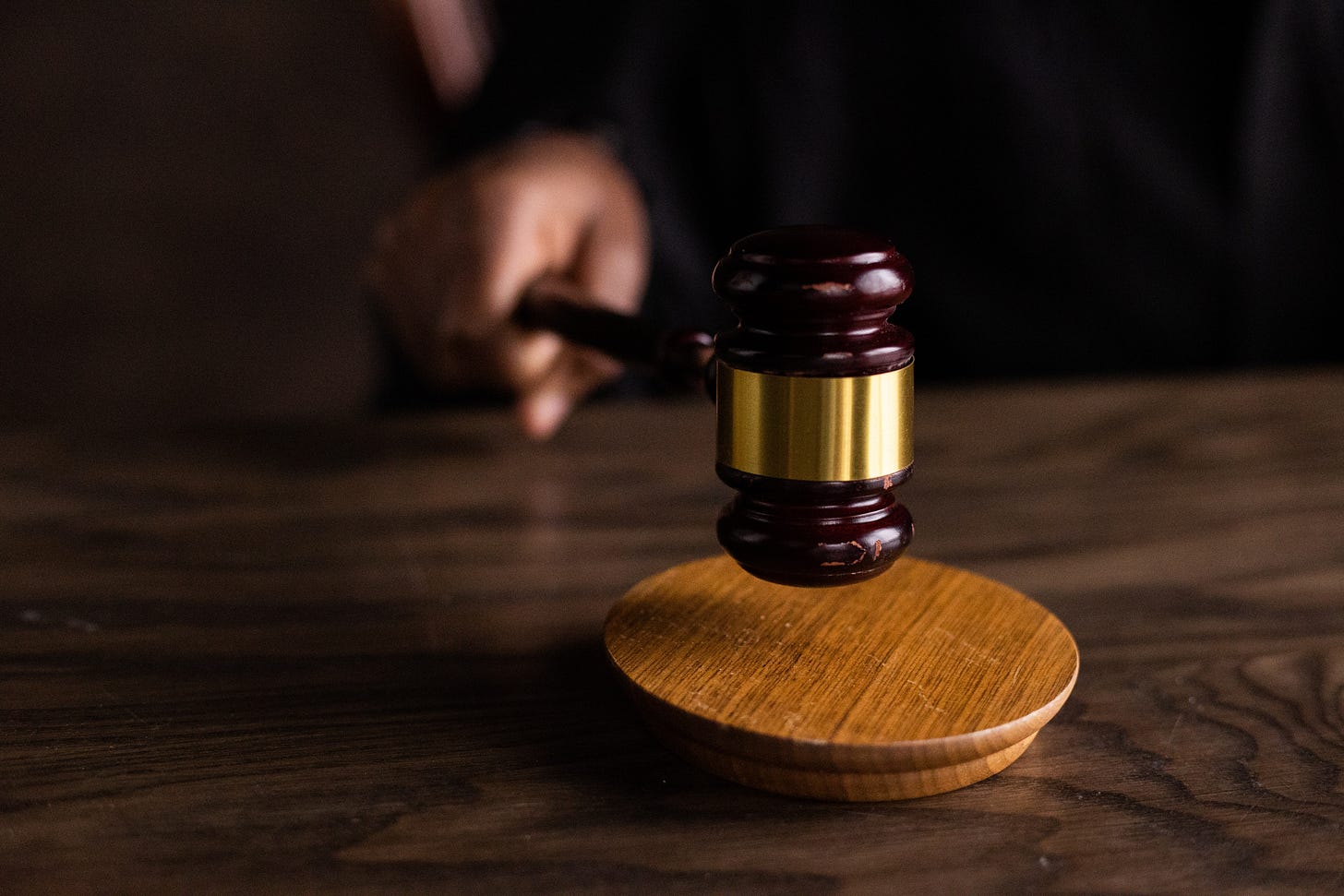Bipartisan Lawmakers Introduce Bill To Require Disclosure of Government Electronic Searches
Photo by EKATERINA BOLOVTSOVA
The Wavelength has moved, which has allowed for a price decrease. Subscribe today. This edition was originally posted in early April.
A bipartisan group of United States (U.S.) lawmakers have introduced legislation to require U.S. courts to reveal orders they issue allowing law enforcement agencies to conduct surveillance of Americans and residents of the U.S. This bill was prompted, in part, by the use of court orders to seek the communications of U.S. journalists during the Trump Administration. The legislation would remove the disparity in U.S. law that allows for some searches and seizures of communications and other materials, especially electronic versions, to be indefinitely kept secret with standing orders made to the communications provider not to inform the subject.
Last year, the New York Times, CNN, and the Washington Post revealed they have been fighting efforts by the United States Department of Justice (DOJ) under both the Trump and Biden administrations to stop the execution of court orders to access the work email of journalists. The New York Times made a compelling case in this article the inquiry started because former President Donald Trump wanted to see if former Federal Bureau of Investigation Director James Comey had divulged classified information to journalists, which is a federal crime. The Washington Post claimed the DOJ was interested in email from the period in 2017 when its reporters were investigating Russian efforts to influence the 2016 election and contact between Russia and Trump campaign officials. Nonetheless, the Biden DOJ ceased litigating to execute the orders in mid-2021 after continuing along the Trump DOJ’s path.
Moreover, while the DOJ did not succeed in getting many of the emails, the DOJ succeeded in obtaining from third party providers, likely major internet service providers (ISPs) or telecommunications providers, information about the journalists’ phone communications and metadata. CNN said that the DOJ “had also been sweeping other electronic accounts” in addition to the work email and communications they wanted. Most likely the DOJ utilized the provisions of the Stored Communications Act (SCA), which is part of the Electronic Communications Privacy Act.
Subscribe to read the rest.
Other Developments
Photo by Pixabay
Australia’s Parliament has passed the “Security Legislation Amendment (Critical Infrastructure Protection) Bill 2022,” and the Governor General granted the royal assent, meaning it has been enacted.
Lord Michael Grade has been confirmed as the United Kingdom’s new head of the Office of Communications for a four year term.
The United States (U.S.) Department of State announced that the Bureau of Cyberspace and Digital Policy (CDP) “began operations.” The new bureau “will address the national security challenges, economic opportunities, and implications for U.S. values associated with cyberspace, digital technologies, and digital policy” and “will be led by a Senate-confirmed Ambassador-at-Large.”
United States (U.S.) Senators Edward Markey (D-MA, Chris Van Hollen (D-MD) and Richard Blumenthal (D-CT) “sent a letter to Netflix, urging the company to take steps to decrease young people’s exposure to tobacco, nicotine, and vaping imagery in video content.”
Australia’s government has started a crypto asset licensing and custody consultation along with “the terms of reference for a review by the Board of Taxation into the appropriate policy framework for the taxation of digital transactions and assets such as crypto.”
The United Kingdom’s Department for Digital, Culture, Media & Sport (DCMS) issued the Cyber Security Breaches Survey 2022 report, which “revealed the frequency of cyber attacks is rising, the number of businesses which experienced an attack or breach remained the same as 2021 levels.”
The White House’s Office of Science and Technology Policy (OSTP) is requesting information “on the protocols, hardware, resources, economics, and other factors that shape the energy use and climate impacts of all types of digital assets” in order “to submit a report to the President that examines the potential for digital assets to impede or advance efforts to tackle climate change and the transition to a clean and reliable electricity grid” per Executive Order 14067 “Ensuring Responsible Development of Digital Assets.”
The United States (U.S.) National Telecommunications and Information Administration (NTIA) announced additions to senior leadership “as we prepare to launch the grant programs in the Broadband Infrastructure Law.”
United States (U.S.) Federal Trade Commission Chair Lina Khan and Commissioner for Justice of the European Commission Didier Reynders issued a joint statement that “addressed their informal dialogue on consumer protection” and “affirmed their mutual interest in reinvigorating this dialogue on consumer issues, especially the impact of technological developments, to maximize the mutual benefits of policy and regulatory cooperation.”
The United States (U.S.) Consumer Financial Protection Bureau (Bureau) issued a bulletin warning that “[w]hen firms frustrate the ability of consumers to post honest reviews of products and services that they use, they may be engaged in conduct prohibited by the Consumer Financial Protection Act (CFPA).”
The United States (U.S.) Privacy and Civil Liberties Oversight Board (PCLOB) “seeks public comments regarding, and will hold a public forum to consider, privacy and civil liberties issues concerning the government's efforts to counter domestic terrorism….regarding the following topics (described in more detail below): Implications for First Amendment-Protected Activities; Implications for Privacy and Fourth Amendment rights; Federal and State/Local/Tribal/Territorial (SLTT) Government Cooperation in Countering Domestic Terrorism; Use of Technology in Efforts to Combat Domestic Terrorism; Differential Impacts on Racial and Other Minority Groups; and any Other Privacy or Civil Liberties Implications Related to Domestic Terrorism.”
The United States (U.S.) National Institute of Standards and Technology (NIST) extended “the call for nominations to serve on the inaugural Internet of Things Advisory Board.”
Tweet of the Day

Further Reading
Photo by Pixabay
“Amazon workers in NYC vote to unionize in historic labor win” By Haleluya Hadero, Anne D'innocenzio and Bobby Caina Calvan — Associated Press
“UK ministers quietly approve Chinese microchip factory takeover” By Eleni Courea — Politico EU
“Biden administration is studying whether to scale back Trump-era cyber authorities at DOD” By Suzanne Smalley — cyberscoop
“Group backed by tech giants claims thousands of members. Many have never heard of it.” By Emily Birnbaum — Politico
“Intelligence community gears up for surveillance powers renewal” By Martin Matishak — The Record
“How Microsoft Became Washington’s Favorite Tech Giant” By Aaron Tilley and Ryan Tracy — Wall Street Journal
“CISA adds seven bugs to Known Exploited Vulnerabilities Catalog” By Jonathan Grieg — The Record
“Huawei faces dilemma over Russia links that risk further US sanctions” By Ryan McMorrow, Anna Gross, Polina Ivanova & Kathrin Hille — Ars Technica
“Viasat confirms report of wiper malware used in Ukraine cyberattack” By Jonathan Grieg — The Record
“Some Russian oligarchs are using U.K. data privacy law to sue” By Reed Albergotti — Washington Post
“A Facebook bug led to increased views of harmful content over six months” By Alex Heath — The Verge
“Cyber War Talks Heat Up at UN With Russia at Table” By Katrina Manson — Bloomberg
“Close ties allow Russian propaganda to spread swiftly through China, report claims” By Helen Davidson — The Guardian






